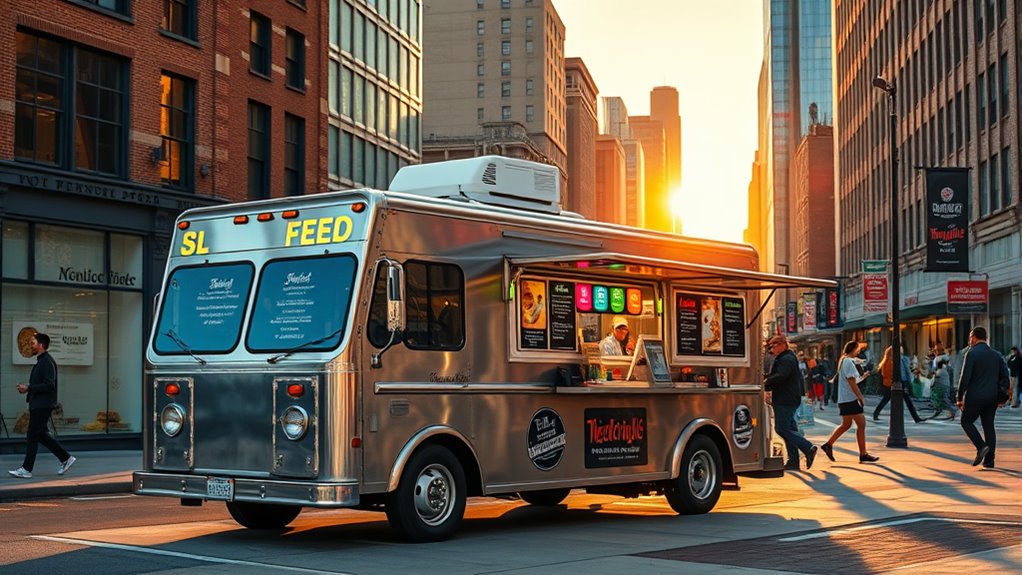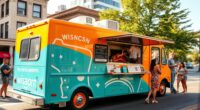To open a food truck in Milwaukee, you’ll need permits like the Mobile Retail Food Establishment license and possibly a Service Base license if using a separate commissary. Startup costs range from around $15,000 for used trucks to over $150,000 for new ones, plus ongoing expenses. Prime spots include downtown and festivals, while a popular menu features local flavors. Effective marketing through social media and community events boosts success; explore further to see how to navigate Milwaukee’s specific rules.
Key Takeaways
- Obtain necessary permits including Mobile Food Establishment license, Service Base license, and local business licenses, plus health and safety inspections.
- Startup costs range from $15,000 for used trucks to $150,000 for new, with monthly expenses around $500-$1,000 for fuel and maintenance.
- Prime locations include downtown, event venues like Summerfest, and institutional campuses for steady customer flow.
- Focus on regional flavors with quick, portable meals, offering dietary options like vegetarian and gluten-free to attract diverse customers.
- Use social media, mobile apps, and community events to build brand recognition, promote local sourcing, and increase customer engagement.
Navigating Permits and Licensing Requirements in Milwaukee
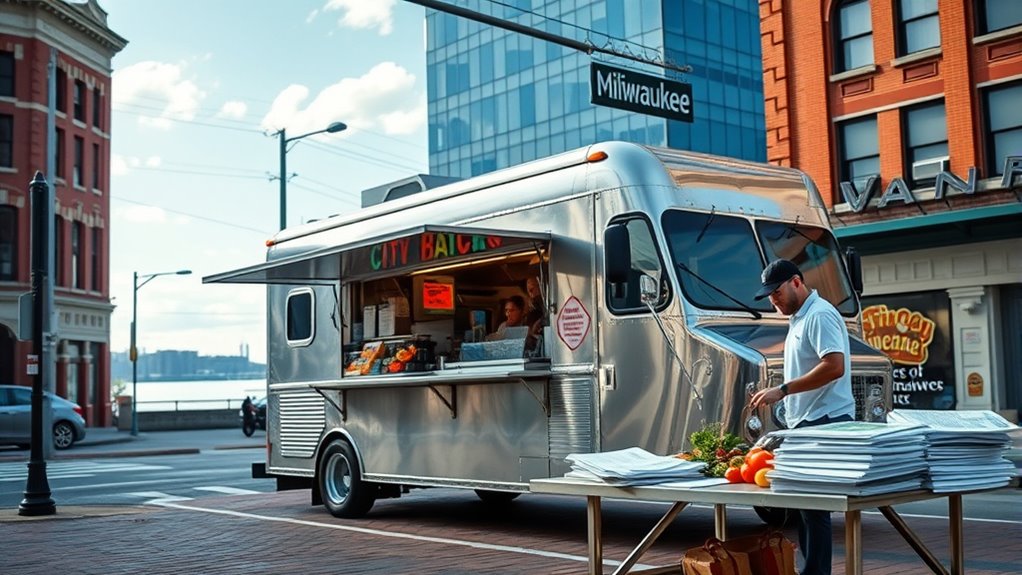
Are you aware of all the permits and licenses needed to operate a food truck in Milwaukee? First, you’ll need a Mobile Retail Food Establishment license at the state level, which covers Wisconsin. Locally, you must obtain a Mobile Food Establishment (MFE) license from the Milwaukee Health Department. If you use a separate commissary, a Service Base license is also required. At least one person on your truck might need Certified Food Protection Manager (CFPM) or food handler training, depending on local rules. Before opening, you’ll undergo plan review, pre-inspections, and pay renewal fees. Additionally, you’ll need a Milwaukee business tax registration, Wisconsin seller’s permit, and possibly a local business or occupational license. Fire, vehicle, and safety inspections are mandatory, and compliance with sanitation rules, including waste disposal and water standards, is essential. The Mobile Sellers License is necessary if you plan to operate across multiple jurisdictions within Milwaukee. Ensuring proper appliance maintenance can help avoid issues with equipment performance and compliance, especially for refrigeration units and cooking appliances.
Estimating Startup and Operating Expenses for Your Food Truck
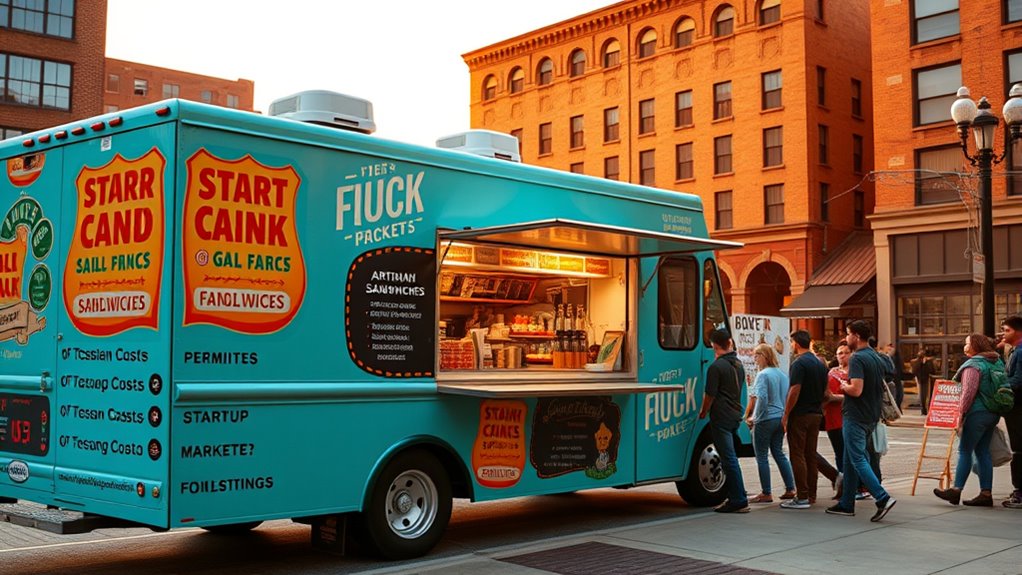
Estimating startup and operating expenses is essential for planning a successful food truck business in Milwaukee. Your initial costs include purchasing a truck, which can range from $15,000 for used to $150,000 for new models, plus outfitting with kitchen equipment. Customization and upgrades also add to expenses. Budget for licensing, permits, and insurance, which may total between $1,800 and $28,000. Initial inventory costs usually fall between $2,000 and $3,000, with additional supplies costing around $300. Monthly expenses like fuel, maintenance, and minor repairs range from $500 to $1,000. Understanding local regulations can significantly impact your overall budget, so researching Milwaukee’s specific requirements is crucial. Here’s a quick overview:
| Expense Type | Range | Notes |
|---|---|---|
| Truck Purchase & Outfitting | $15,000–$150,000 | Used or new, equipment upgrades |
| Licensing & Permits | $1,800–$28,000 | Varies by city and scope |
| Initial Inventory | $2,000–$3,000 | Food, supplies, disposables |
| Monthly Operating Costs | $500–$1,000 | Fuel, maintenance, minor repairs |
| Marketing & Branding | Variable | Logo, signage, social media ads |
Identifying Prime Locations and High-Traffic Spots in Milwaukee
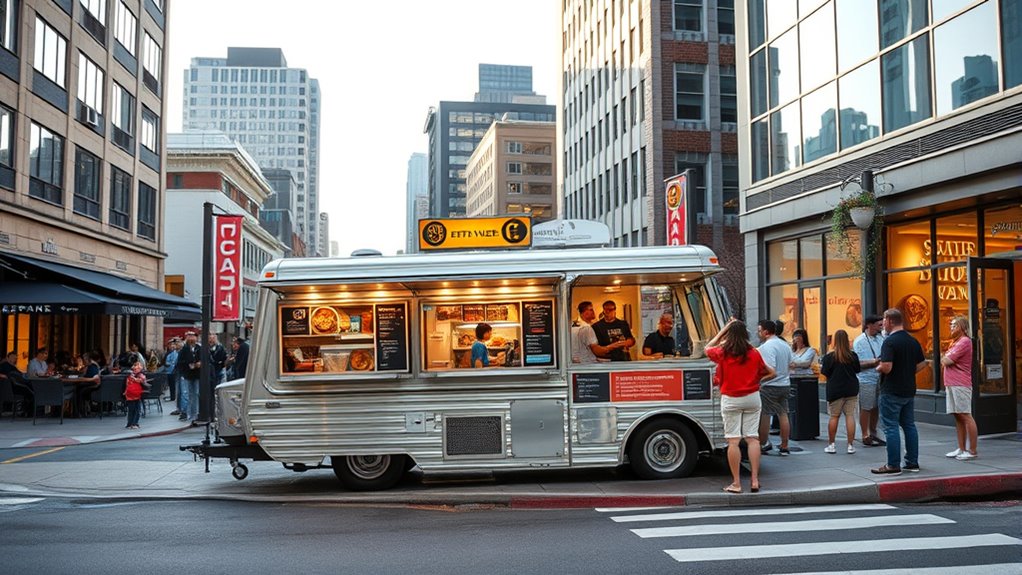
To maximize your food truck’s visibility and sales in Milwaukee, focus on high-traffic areas with proven footfall. Downtown & Theater Districts see heavy pedestrian traffic during lunch and evenings, especially along Water Street and Old World Third Street, with thousands of people during events. The central business district brings reliable lunch demand from office workers, while proximity to venues like the Marcus Center boosts late-afternoon and post-show sales. Milwaukee neighborhoods and offices regularly host food truck rotations, providing ongoing opportunities for visibility and customer engagement. Consider these key spots:
- Major festivals like Summerfest and Bastille Days, which attract tens of thousands and offer high-volume vendor opportunities.
- Brewers Hill and neighborhood events, with recurring markets and block parties perfect for sharing menus.
- University and medical campuses, where high student and staff populations generate steady daytime sales. Additionally, understanding local regulations and compliance requirements can help ensure your operations run smoothly in these areas.
Developing a Menu Strategy That Appeals to Local Customers
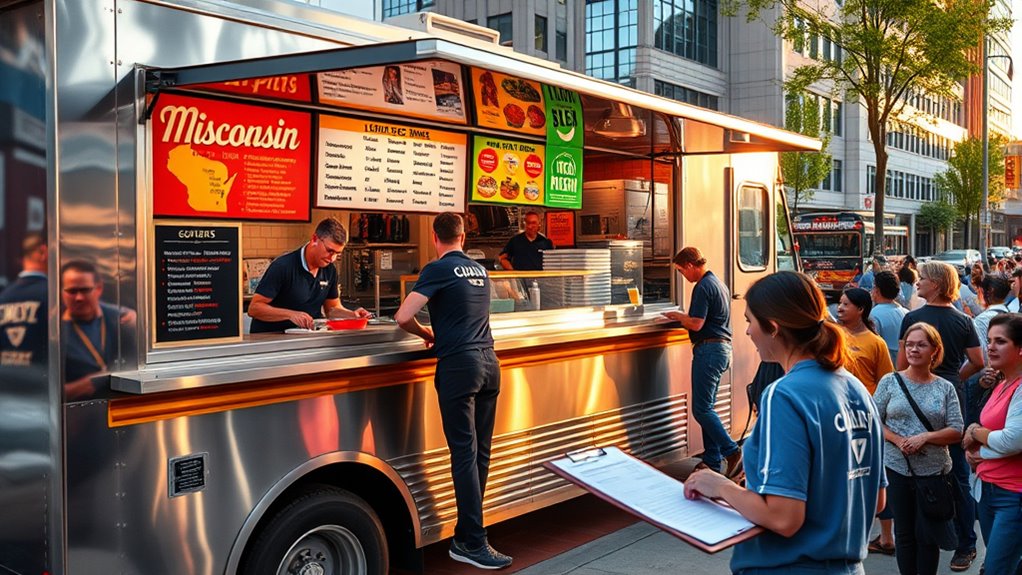
To attract local customers, you should focus on incorporating regional flavors like cheese, bratwurst, and Great Lakes fish into your menu. Make sure your offerings are quick to prepare, so you can serve customers efficiently during busy times. Including dietary options such as vegetarian and gluten-aware dishes will help meet diverse preferences and stand out in Milwaukee’s competitive food scene. Additionally, maximizing space and organization in your food truck can improve efficiency and customer experience.
Emphasize Regional Flavors
Focusing your menu on regional flavors creates a strong connection with Milwaukee customers by highlighting the area’s culinary heritage. To do this effectively, emphasize key local staples:
- Offer signature items like cheese curds, Friday fish fry (perch or walleye), and bratwurst, which resonate with regional traditions.
- Incorporate seasonal ingredients such as cranberries and cherries for specials, showcasing Wisconsin’s produce.
- Use regional sourcing—Wisconsin dairy, Great Lakes fish, local bakeries and butchers—to strengthen authenticity and story.
- Implement automation technologies within your operations to streamline ordering and inventory management, enhancing customer service and efficiency.
Create modular plates or combos that feature multiple regional items, increasing the perceived value. Rotating specials and offering vegetarian riffs can broaden appeal while maintaining regional authenticity. This approach deepens customer loyalty and celebrates Milwaukee’s culinary identity.
Prioritize Quick Preparation
Developing a menu that prioritizes quick preparation means selecting items that can be assembled rapidly and require minimal cooking time. Focus on handheld foods or single-plate meals to minimize plating delays and serve customers faster. Use pre-cooked or partially prepared ingredients that can be quickly finished on-site, avoiding dishes with long cook times or multiple steps. Limit your menu options to focus on quality and speed, making it easier to deliver consistent, quick service. Source ingredients locally when possible to reduce delays and prepare them daily in batches. Organize ingredients in easy-to-access containers and use multi-functional items to streamline stock. Incorporate technology like POS systems and digital menus to speed ordering, ensuring your food truck keeps pace with busy Milwaukee customers. Milwaukee’s demand for quick, flavorful seafood options can be met effectively by streamlining your menu and service process. Additionally, understanding cookie categories can help you optimize your website for faster user interactions and better customer engagement.
Incorporate Dietary Options
Creating a menu that appeals to Milwaukee’s diverse and evolving tastes involves thoughtfully incorporating dietary options. To do this effectively, focus on these key strategies:
- Include seafood choices like lobster rolls and bisques to attract seafood lovers and leverage local favorites. Offering a variety of seafood options can also highlight the region’s culinary diversity and appeal to tourists seeking authentic local flavors.
- Offer vegetarian and vegan dishes made with fresh, local produce to meet the growing health-conscious and plant-based demand. Incorporating local ingredients not only enhances flavor but also supports regional farmers and aligns with sustainable practices.
- Clearly label gluten-free options and allergens to accommodate dietary restrictions and increase trust. Transparent communication about ingredients builds customer confidence and encourages repeat visits.
- Supporting local farms and small businesses in your sourcing can enhance menu appeal and demonstrate community commitment. This approach emphasizes freshness and quality, resonating with customers who value local sustainability efforts.
Balancing comfort foods with lighter, seasonal salads or bowls broadens your appeal. Emphasize quality ingredients and ethnic roots in descriptions to attract curious customers. Promoting these options on social media and at local events helps build a loyal, diverse customer base that values inclusivity and freshness.
Effective Marketing and Branding Tactics for Food Truck Success
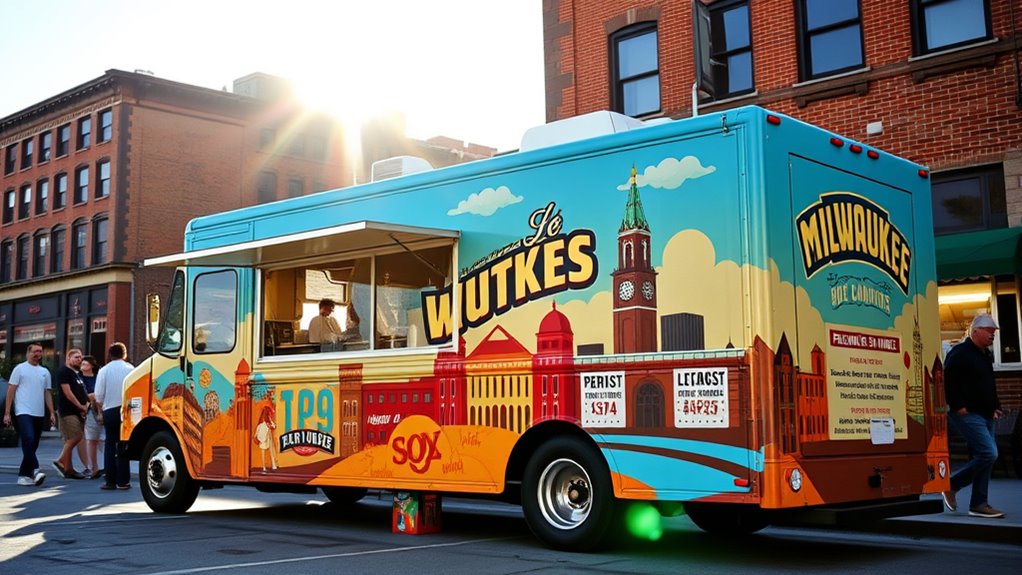
To stand out in Milwaukee’s competitive food truck scene, effective marketing and branding are essential. You should leverage social media platforms like Facebook, used by 75% of trucks, to boost visibility. Engaging customers online can increase sales by 20% and make your truck easier to find with popular mobile apps, which grew in use by 35%. Participating in local events and festivals—attended by 80% of trucks—can generate immediate sales and enhance brand recognition. Using data analytics helps tailor menus and promotions, improving ROI by 25%. Loyalty programs, adopted by over half of trucks, boost repeat visits by 30%. Ultimately, developing a unique menu and visual identity distinguishes your truck from competitors. Here’s a quick overview:
| Strategy | Impact |
|---|---|
| Social media marketing | +20% sales |
| Event participation | Increased visibility |
| Data analytics | Higher ROI |
| Loyalty programs | 30% more repeat visits |
| Unique branding | Differentiation |
Additionally, understanding and applying website optimization strategies can further strengthen your online presence and attract more customers.
Managing Risks and Ensuring Compliance With Local Regulations
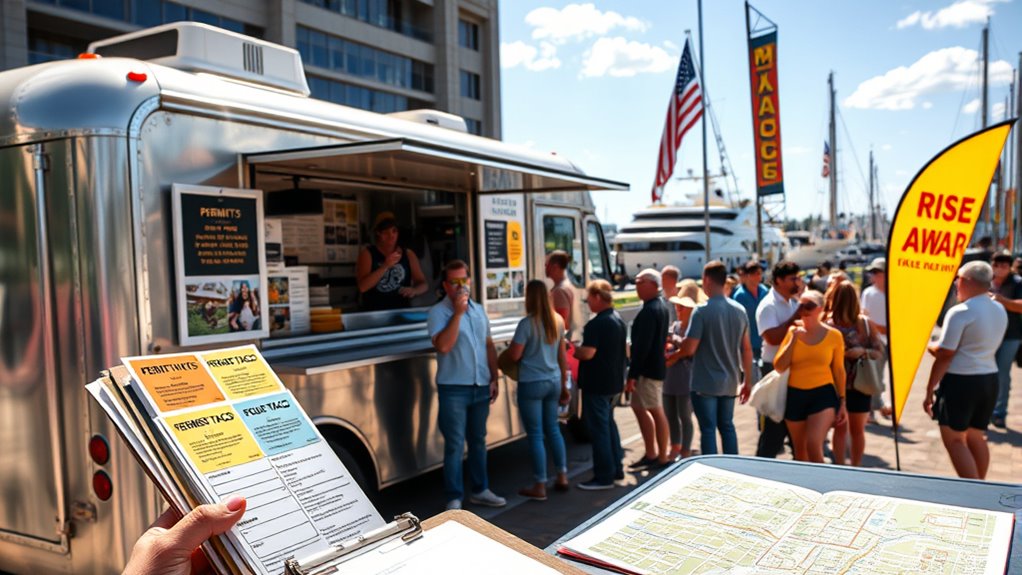
Successfully operating a food truck in Milwaukee requires more than just a great menu and strong branding; you also need to navigate a complex web of local regulations and manage potential risks. First, verify you have the necessary licenses, such as the Mobile Retail Food Establishment (MFE) license, and obtain any city-specific permits. Second, follow health and safety standards, including daily cleaning, proper temperature controls, and allergen labeling, while maintaining documentation like logs and training records. Third, be aware of zoning and location restrictions, which may include designated zones, operating hours, and prohibited streets. Additionally, securing general liability and auto insurance is essential to protect against liabilities. Recent regulations include time limits and minimum distances from restaurants, which may affect your operating schedule and location choices. Staying compliant minimizes legal issues, prevents fines, and helps you operate smoothly in Milwaukee. It is also important to stay informed about local health codes, which may evolve and impact your daily operations.
Frequently Asked Questions
How Long Does the Milwaukee Permit Approval Process Typically Take?
The Milwaukee permit approval process usually takes about 3 to 4 weeks, but it can vary. You need to submit a complete application, pass health and safety inspections, and possibly attend hearings. To avoid delays, start early, make certain all documents are accurate, and respond quickly to city requests. For temporary event permits, apply at least a month in advance to give yourself enough time for approvals and inspections.
Are There Specific Milwaukee Zoning Laws for Food Truck Parking Spots?
You need to know Milwaukee’s zoning laws for food truck parking spots. The city classifies zones into Type 1 and Type 2, each with specific rules. Type 1 zones restrict operation times and parking duration, especially downtown until 1 a.m. You can’t park within 50 feet of restaurants without drive-thrus, and density limits apply in Type 2 zones. Signage and street requirements also regulate where and how you can park your truck legally.
What Are the Common Costs for Food Truck Insurance in Milwaukee?
Imagine your food truck wrapped in a shield against unforeseen storms—that’s insurance. In Milwaukee, expect to pay around $105 per month for an all-encompassing policy, covering liability, property, and auto risks. Costs can range from $25 to $125 monthly, depending on coverage levels and your truck’s specifics. Additional coverage like equipment or workers’ comp can increase expenses, but it’s essential to safeguard your business’s future.
Which Milwaukee Festivals or Events Are Best for Food Truck Vendors?
You should target Milwaukee’s biggest festivals like Summerfest, which draws over 800,000 attendees and offers high sales potential during peak times. Wisconsin State Fair and German Fest also attract large crowds interested in diverse and ethnic foods. Recurring events like food truck rallies, farmers markets, and brewery nights provide steady, community-focused crowds. These festivals and events give you excellent exposure, reliable foot traffic, and opportunities to test new menu items.
How Do Weather Conditions Affect Food Truck Operations in Milwaukee?
Imagine a scene from a bygone era—your food truck battling Milwaukee’s weather like a ship in a storm. You’re affected by summer heat, which raises interior temps and cuts lunch sales; cold winters shorten your season; and rain or snow disrupt routes and reduce foot traffic. Wind and storms threaten safety, while temperature swings complicate staffing, inventory, and equipment. Flexibility, weather awareness, and strategic planning are key to keeping your operation afloat.
Conclusion
Starting your food truck in Milwaukee is like planting a seed—you’ll need the right permits, a tasty menu, and prime spots to grow. With careful planning and smart marketing, your venture can flourish amid the city’s bustling streets. Keep in mind, steering through regulations is your compass, guiding you safely through the journey. Stay adaptable, and watch your food truck become a flavorful landmark in Milwaukee’s vibrant food scene.
